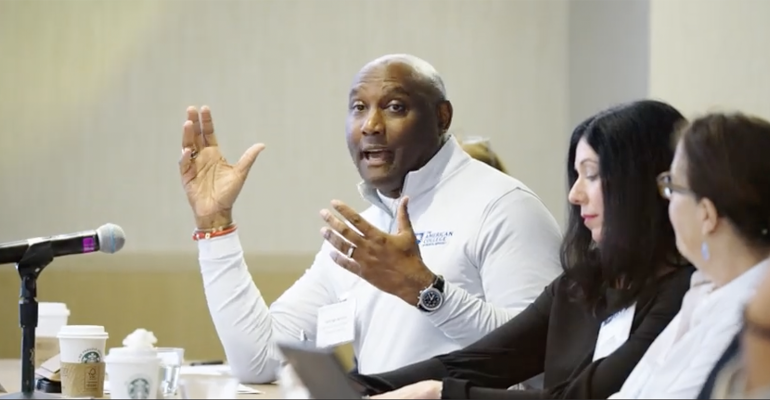Confronting the financial services industry’s paltry outreach to clients in underrepresented minority groups will involve rethinking its AUM business model, according to several speakers at the WealthManagement.com Diversity, Equity, Inclusion & Belonging Think Tank last week.
George Nichols, the president and CEO of the American College of Financial Services, said he was bothered by claims that more diverse clients would naturally result from the industry hiring more Black and Hispanic advisors without amending the same approaches that contributed to a customer base with low diversity.
“There’s this requirement that we’ll have to rethink the model,” he said. “We’re thinking about how we get the money, but we’re not even thinking about changing the model.”
The think tank, entitled “Focus on the Future” and held in conjunction with the annual “Wealthies” Awards in New York City, brought together reps, thought leaders and members of organizations and firms ranging from the CFP Board to Carson Wealth and Janney Montgomery Scott.
The informal discussion hit numerous topics, ranging from how companies frame job descriptions in ways that may exclude certain exemplary candidates, how firms and organizations should weigh a college degree when considering a rep for employment or membership, and the value of lobbying for financial literacy additions to early childhood education curriculum.
But Heather Robertson Fortner, the chair and CEO of Atlanta-based firm SignatureFD, said the industry’s most pernicious issue was it had yet to figure out how to expand its services into populations it had done a poor job of serving previously (and to make money doing so).
“If we don’t solve that problem, our industry does the same thing over and over, which is go and serve the top 1 to 5% of people who have the assets that can sit and make under-management revenue for us,” she said.
To Travis Walker, a business solutions and diversity consultant with Allianz Life, the wealth management industry’s hesitancy in expanding the scope of its clients’ diversity stemmed from a lack of imagination and little imperative from inside or out of organizations to do so.
Previously, he argued, wealth managers could ignore communities like Black and Hispanic individuals. But now, with Hispanics the fastest-growing demographic in affluence, and with Black Americans opening more brokerage accounts than any other group post-pandemic, advisors and reps can't afford to ignore them anymore.
“It was lazy, and a reflex; just go right to the boomers, and keep going to that well that is actively drying up,” he said. “We didn’t figure it out because we didn’t have to figure it out.”
Walker added that fighting for financial literacy education in the classroom is ever more challenging in the context of some of the most embittered political and cultural clashes in the country today involving proposed bans on certain books in classrooms.
“If the ship is taking on water, just know that there are still people actively drilling holes in the boat,” he said.





